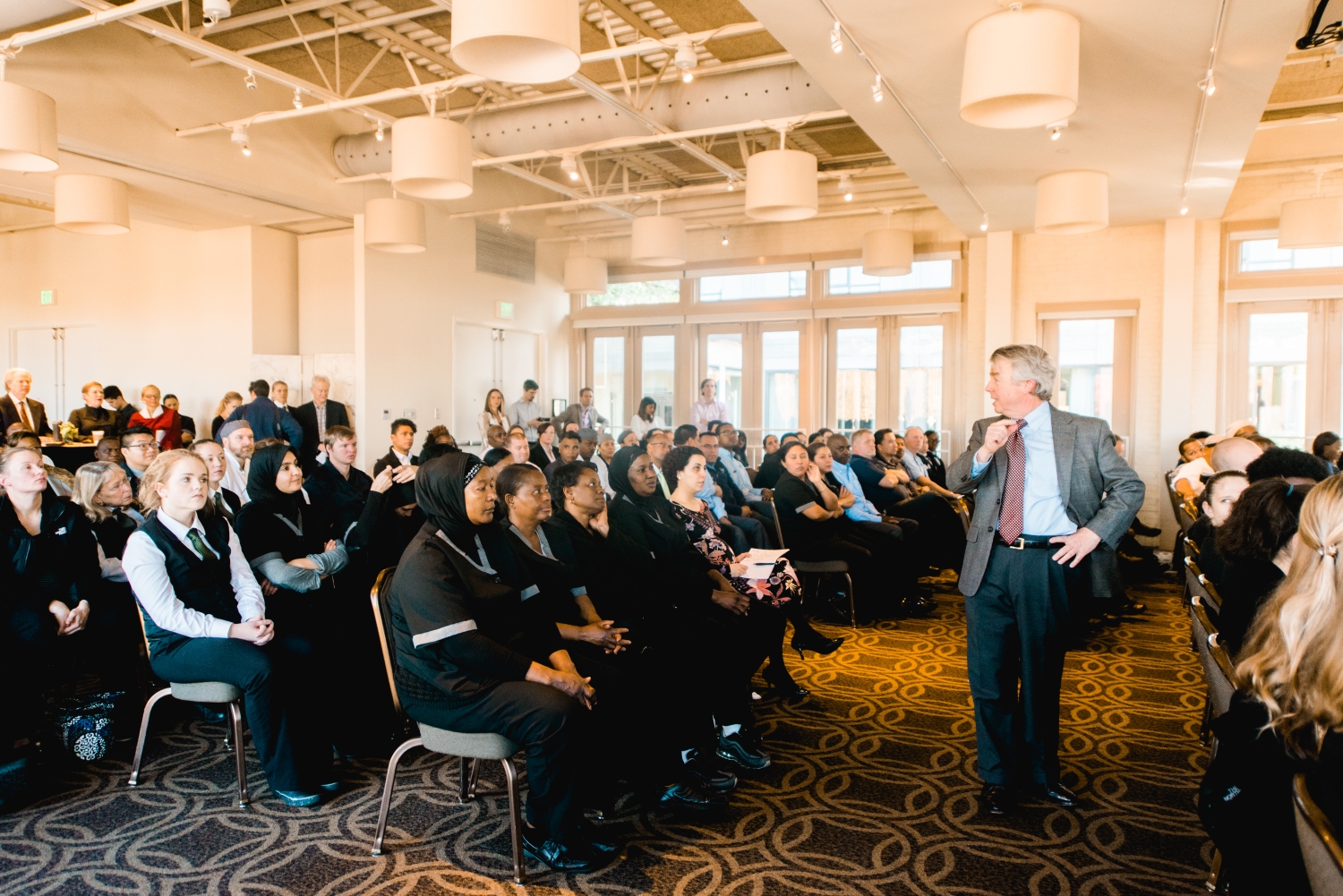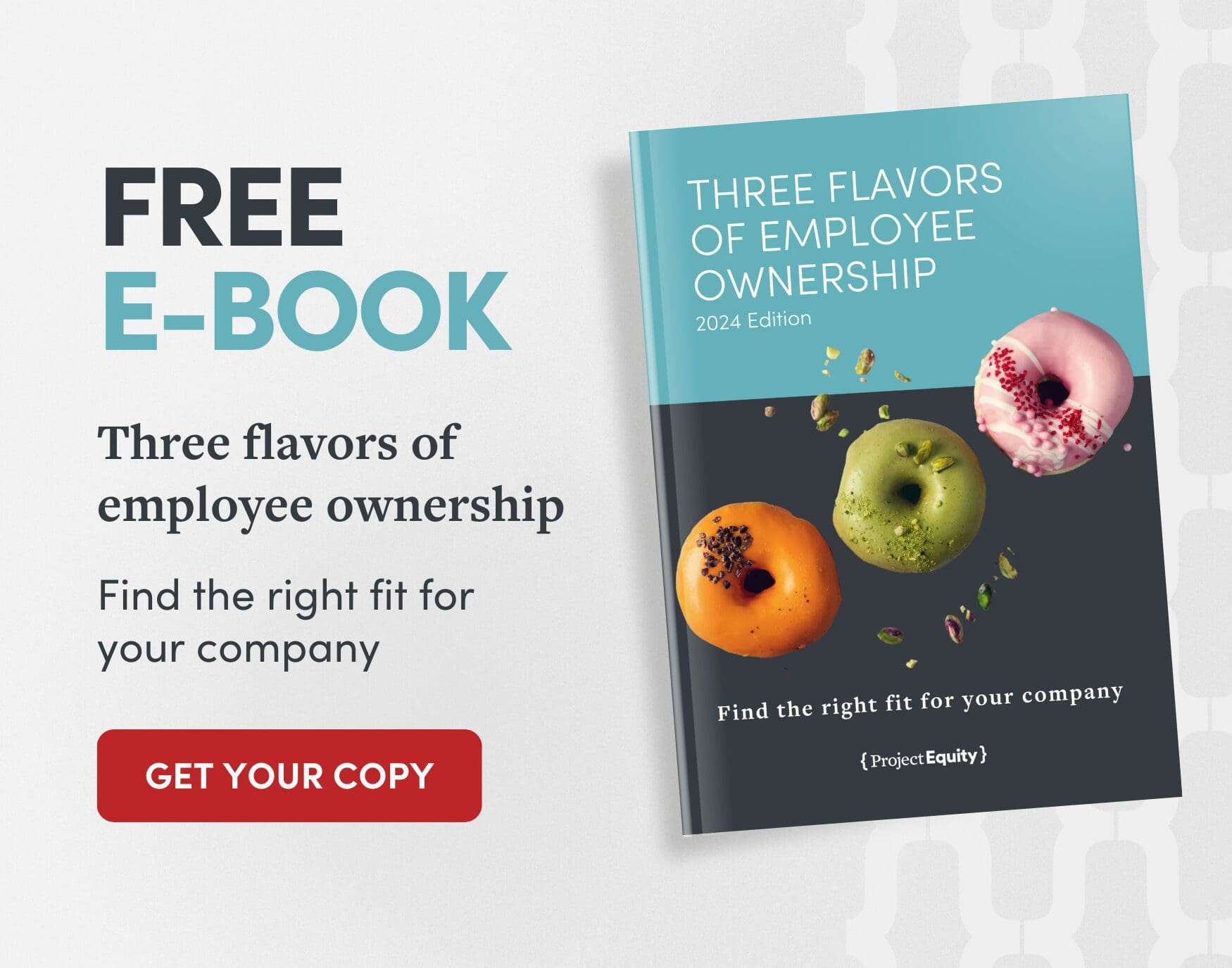Coming back strong
- Project Equity
How one hospitality company’s employee ownership values helped them survive during the COVID pandemic
Research shows that employee-owned companies fared better than traditionally-owned firms during the COVID-19 pandemic in 2020. They were four times more likely to protect their workers’ jobs, and six times more likely to feel that their business was on its way back to normal.
That doesn’t mean that employee-owned companies were somehow immune to the economic impact of the pandemic. Rather, it shows how the benefits of employee ownership–from tax savings to a culture that puts workers first–can boost a business’s resilience in the face of historic challenges.
The pandemic dealt a massive blow to nearly every industry, but the hospitality industry was hit particularly hard. Quaintance-Weaver Restaurants and Hotels (QW) was no exception. Their suite of four restaurants and two hotels in and around Greensboro, NC were all forced to close.
In the face of this monumental challenge, QW stuck to the values that led it to become 100% employee-owned through an ESOP (Employee Stock Ownership Plan) in 2016.
By putting the needs of its people front and center, they not only endured one of the biggest challenges the hospitality industry has ever faced, but put themselves in the position to come roaring back.
Communicating in a crisis
As both a means to extend a business’s longevity beyond the tenure of its original owners and a qualified retirement plan, ESOPs epitomize long-term thinking. That made it a natural fit for QW, a company that has always tried to plan decades down the line, even keeping one chair empty when making important decisions to remind themselves to consider the impact on future QW employees or customers who may not have even been born yet.
When the COVID-19 pandemic struck in early 2020, though, that desire to think long-term was replaced with the need to adapt to a crisis that was changing by the day. Their ESOP was still young–the first eligible employees had only just started becoming vested–but CEO Dennis Quaintance reacted to the emerging challenge with the transparency and honesty that define the most successful employee-owned firms.
As the situation developed and shifted, Quaintance wrote a series of heartfelt letters to the QW staff, doing his best to explain the latest developments as they occurred. An early letter offered advice to the staff on “how to maintain social distance from customers without being weird.” Only two weeks later, he sent a letter announcing that all of QW’s restaurants and hotels were shutting down indefinitely.
630 out of QW’s 670 staff members were ultimately furloughed. QW’s revenue dropped to zero, then on top of that, they had to refund deposits for canceled events. Their ESOP lost 90% of its value, but only one employee ever raised a complaint–a testament to how open and inclusive QW was in their communications.
Quaintance continued to write to the staff as the pandemic went on, providing a clear-eyed view of the state of the company and their hopes for reopening. He gave voice to the employees’ concerns—about the company, the pandemic, the growing civil unrest following the death of George Floyd—and regularly recognized his own privilege and the systemic inequities that put so much burden on the workers who could afford it the least.
“Let’s stick with our values and be loving, compassionate and of service to our sisters and brothers and siblings all, including ourselves,” Quaintance wrote in July 2020. “Let’s practice the highest levels of safety and sanitation, let’s be an island of fairness in a sea of inequity and let’s be responsible with our finances for the benefit of our staff member-owners.”
Supporting their employees
Despite the financial hardship the company faced, the focus of QW’s leadership remained on supporting their employees in whatever ways possible.
The company provided lists of resources for employees who might be struggling physically, financially or mentally, ranging from low-cost health care to mutual aid funds to Alcoholics Anonymous. QW also fully covered their furloughed employees’ health insurance for months, until they were able to partially reopen and start bringing people back to work.
The Quaintance and Weaver families even pooled $200,000 of their own money to create a QW Furloughed Staff Member Relief Fund that provided payments to each employee that, unlike unemployment benefits, were not tied to their salary.
Quaintance’s communications and the company’s actions throughout 2020 were transparent, honest, and focused on equity — prime examples of employee ownership values in action during a time of unprecedented crisis.
Getting the band back together
“The ESOP made the shutdown a lot better because we were all in it together,” Quaintance said. “We’re all employee-owners. We were hurting individually, but also hurting collectively. We were there for each other. And as we started to come out of the worst of it, it was like getting the band back together.”
QW even demonstrated their employee ownership culture in the way they prepared to reopen for in-person dining in the age of social distancing. Where other restaurants simply removed tables or put up plastic sheeting, QW employed its team of in-house artisans to renovate its dining rooms with dividers that thoughtfully incorporated each space’s individual aesthetics. It was a decision that showed their commitment to going the extra mile, and earned them a glowing write-up from The Triad Business Journal.
The Greensboro community welcomed QW’s businesses back with open arms. The restaurants have been thriving since in-person dining returned. Not all the furloughed employees came back, however; by the time QW was able to get the bulk of its employee-owners back to work, many of them had moved on. At the time of this writing (in October 2021), QW is hiring for 90 positions to keep up with the customer demand.
And, of course, a centerpiece of their hiring efforts is the fact that they are 100% employee-owned.
Article details
Audience
Topic
Not applicable


